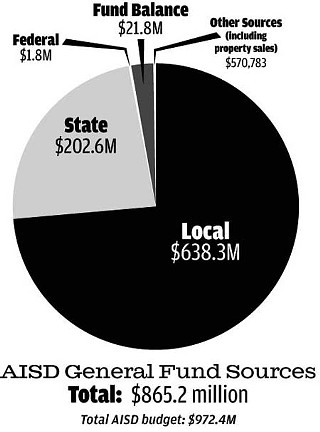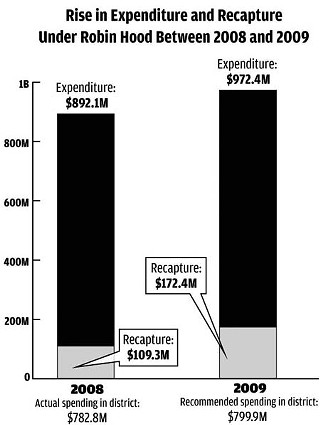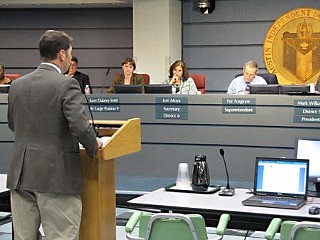AISD Takes a Tax Bite to Voters
School board hammers out a budget
By Richard Whittaker, Fri., Aug. 29, 2008

On Monday night, after a couple of years of nominal budget surpluses and property tax rate cuts, Austin ISD's board of trustees agreed on some very different numbers for the upcoming year. Property tax rates are set to rise, and the district will also dip into its savings. On top of this, there's a new challenge: convincing Austin voters to agree to a tax increase on Nov. 4.
District administrators presented the board with a projected 2009 budget of $971.8 million. This split in three: $864.7 million for the General Fund, paying for staff and operations; $72.8 million for debt service, which pays off bonds; and $34.3 million for food service. Included in the General Fund were several key components: a 3% pay raise for teachers and full-time staff, continued full employee health care, $10-per-hour minimum wages for full-time employees ($7 for part-time), and increases in workers' compensation.
In an unusual step, the board made its own last-minute additions to the General Fund. At the prompting of faculty and staff union Education Austin, board member Karen Dulaney Smith introduced a sliding minimum pay scale for substitute teachers – from $10.62 for certified teaching subs to $8.75 for classified subs – costing $292,000. Vice President Vincent Torres got $60,000 to continue funding for a health and wellness specialist. When amendments and staff recalculations were added, the board unanimously approved a General Fund budget of $865.2 million and a total district budget of $972.4 million.

How to pay for it? The district has three revenue streams – local property taxes, plus state and federal contributions. The local component is the biggest slice and breaks in two: maintenance and operation (M&0), which goes into the General Fund; and interest and sinking (I&S), which pays for debt service (food service is paid for by federal funds and student payments). Each has its own tax rate: M&O is at a six-year low of $10.40 per $1,000 per year of appraised value, while I&S has stayed constant at $1.23 since 2004. On Monday, the board approved a 39-cent hike on M&O while keeping I&S static, giving a combined tax rate of $12.02 per $1,000 of appraised value.
But agreeing the rate among the nine-member board was the easy part. Now they have to get Austin voters to sign off on the tax raise.
The Robin Hood Shuffle
Automatic tax ratification elections are new to Texas. Previously, the district could raise M&O taxes to a $15-per-$1,000-value cap. But under changes made during 2006's third legislative special session, increases must now go before district voters. This has all three of the most vocal participants in the budget process – the board, Education Austin, and the Greater Austin Chamber of Commerce – concerned about what may happen in November. Education Austin's members are most worried, because the board tied the pay increase to the tax increase. No yes vote, no 3%.
The biggest struggle could be explaining why, for every new 4 cents the district collects, it only keeps half of 1 cent. Recapture, aka "Robin Hood" – the state system whereby districts with high property values subsidize property-poor districts – penalizes economically divided districts like Austin that, as board Chairman Mark Williams described them, are "property-rich and people-poor." Under rules introduced in the 2007 legislative session, explained AISD's Chief Financial Officer Larry Throm, "Our recapture payment to the state is increasing from $109 million to $172 million, up $63 million."

Austin generally votes for education funding. In May, a $343.7 million bond package passed by a 3-to-1 margin. But the tax ratification experiences of other districts bode ill. Last November, five Central Texas ISDs – Edgewood, Harlandale, San Antonio, Somerset, and Southside – held tax elections, and only Edgewood voters approved their increase (San Antonio returns to voters for another shot this November). "I would be surprised if more than a few people really understood what school finance reform has done," said Williams. "The state takes the money, but the school district is the bad guy."
There are few signs the next Legislature will change the situation. Rep. Dawnna Dukes, D-Austin, a House Appropriations Committee member, argues that education funding reform is complex. "If one were to look at Robin Hood just as it related to Austin," she said, "one would say that it wasn't the best funding mechanism, but it's a funding mechanism that's strongly supported by state Democrats." That's in large part because without some form of revenue sharing, the property-poor districts, historically woefully underfunded, would be in even worse shape.
Even if the M&O tax rate passes, local revenue will only generate an estimated $638.3 million. Combined with federal and state money, plus sale of "junk" property, that will leave the district $21.8 million short in the General Fund. To cover the difference, AISD will dip into its rainy-day account (the "fund balance") estimated to reach $130 million by month's end. There are competing estimates of how much and for how long the district must raid the balance: $15 million of staff projection are recurring costs, and several big ticket projects, like the Eastside Memorial High (Johnston) repurposing, have yet to be priced. At the board's Aug. 18 meeting, Torres told his fellow trustees the final figure could be $30 million a year for the next two years. The chamber says it will support the tax increase and tapping the fund but recommends maintaining the fund balance at $120 million to $170 million. Gene Austin, the chamber's vice chairman for education and talent development, said: "If the fund balance were to go to $60 million, that would really reduce your wiggle room. We at the chamber are not comfortable going that far down."
At Monday's meeting, Superintendent Pat Forgione set $105 million as the lowest acceptable fund balance. Go deeper, he said, and it hurts the district's bond rating, forces program cuts, and hampers the search for his replacement when he retires next year. But Education Austin has criticized this limit as penny-pinching, arguing that the district always underestimates revenue and exceeds predicted fund balance increases.
Smaller Victories
The lasting impact of this year's budget process may not be financial but pressure to reform how the district builds budgets. Trustees Sam Guzman and Rob Schneider both argued that AISD needs to listen to the chamber less and to other interested parties more. Echoing frustrations from the last bond process about public input, the board moved to appoint a budget committee. Separate from the superintendent's Budget Task Force and more like the Citizens' Bond Advisory Committee, the budget committee will analyze current spending and make recommendations for the 2010 budget. Similarly, after EA called for a $150-per-month contribution toward family health insurance and Guzman proposed a 3.5% pay raise to help with medical costs for all employees, the board approved an independent study group on health-care provision and purchasing. Both bodies will form in October. Chamber spokesman Drew Scheberle said these steps "show the district is taking own-ership of its budget."
While his members have the most to lose, Education Austin president Louis Malfaro was confident that Austin voters will ratify the tax once they understand the tax hike is $8 per month for the median appraised-value house and essential for his members' pay raise. However, he was disappointed the board was not prepared to find the $9 million required to meet all his members' needs, especially since even Education Austin's original request for a pay raise of 5% fell below a 6% cost of living increase. He remained philosophical about the 3%, and said, "It's half a glass, but it's better than no glass."
Got something to say on the subject? Send a letter to the editor.










